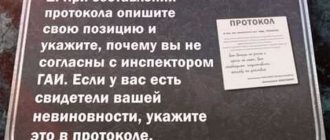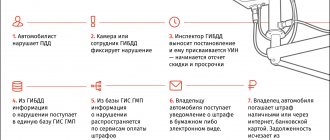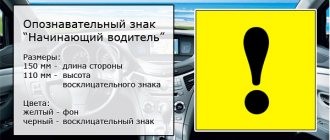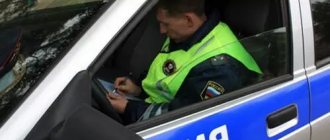What is a petition and what is it regulated by?
At its core, a petition (hereinafter also referred to as “hoda”) is a request. It is declared in writing to the traffic police inspector on the road or to the judge who is considering the case. The procedure itself in the legal community is called a “petition.” That is, the person submitting it petitions for something - asks for something from a traffic police officer or a court.
It is not a complaint - you should not write in it about illegal actions, or describe the current situation - whether you are subject to a fine or deprivation of your license or an accident. It is this petition – which one – that determines the type of this document, which we will talk about below.
As of 2021, only one normative act regulates it - article 24.4 of the Code of Administrative Offenses of the Russian Federation.
What types are there?
The type of petition depends on what exactly you are requesting in writing. And their list is not established by law - in fact, you can apply for anything.
But the most common types are:
- a petition to consider the case in the absence of the plaintiff (in civil proceedings - for example, after an accident),
- about consideration at the place of residence,
- about hiring a lawyer,
- on the restoration of missed deadlines for appealing the decision,
- to restore the missed deadline of 20 days to pay the traffic police fine at a discount,
- on the postponement of consideration of the case due to the personal circumstances of the person involved or another person (witness, understandable),
- on the inclusion of evidence in the case materials (video recordings from the recorder or external cameras, witness testimony and other data),
- about familiarization with the case materials,
- on imposing a minimum punishment (when the sanction of the Code of Administrative Offenses of the Russian Federation provides for a range of punishments - for example, in the form of a fine of 5,000 rubles or deprivation of rights),
- on reducing (reducing) the fine if the standard of punishment provides for a “fork” of amounts (for example, a fine for driving without a license is from 5 to 15 thousand rubles, and the traffic police inspector on the road sets the maximum amount),
- on replacing punishment with a warning or verbal reprimand,
- on the appointment of an examination on the circumstances of the case,
- on deferment/installment payment of a fine (submitted to the judge),
- about summoning witnesses to court,
- about the possibility of videotaping or audio recording in the courtroom,
- a petition from the prosecutor to seize property within the framework of the court.
How to file a petition for non-deprivation of a driver's license?
A petition for non-deprivation of a driver's license is a document that contains a request to replace one type of punishment with another. To support such treatment, the accused must identify the factors that are relevant in the case.
Such a petition must be drafted correctly, otherwise it will not be considered in court.
The application must contain:
- The name of the court or organization in whose name the document will be filed.
- The grounds that served as the reason for filing (for example, when a driver is the only profession of the accused).
- Key points that relate to the case under consideration (location of traffic violation, time, article providing for punishment, other significant factors).
- A properly formulated request .
- List of attached documents , depending on the specific situation, proving the arguments of the application (certificates from work, loan obligations, presence of dependents).
- Date of. Signature.
If the application is submitted from a company, it is recommended to issue it on company letterhead to give the document greater significance. All information must be presented briefly, but at the same time informative. In addition, you cannot use some expressions, for example, “if” and the like. Also, the applicant does not have the right to express his own conclusions or make assumptions or give instructions to the judge.
Application form, sample and examples
The petition does not have a specific approved form or sample. The document is written in free form by hand with a pen, pencil, marker - anything of any color. The main thing is that it contains your signature, indicates who it is being sent to, and is legible. Otherwise, you will simply be denied its satisfaction.
But the main thing is that if you need to write it to a traffic police officer on the road, then this must be done very quickly. Therefore, we strongly recommend that you print out the so-called “fish” - all the necessary basic data, and fill out the essence and to whom it is sent on the spot. Below we will provide a general sample of a petition and then you will learn what to write for each type and why there is so little time to submit this document.
General sample
So, the application must indicate:
- to whom and from whom it is declared (cap),
- what is being stated and on what basis,
- the petition itself (text of the petition),
- signature and date of submission of the document.
This is what a typical example of a “fish” petition looks like without its essence stated:
Here is a correctly completed sample of this form:
in DOCX format. Or the same form in PDF format.
We gave an example of a “motion” to postpone the consideration of a case due to the need for legal assistance in the form of a defense attorney or attorney. Now let's look at the other most common statements in this document and provide samples and examples of each of them.
Attention! We will provide samples of filling out only the essence (as well as a complete sample of this petition in the form of a file), since the header, preamble and places for signatures and dates are the same everywhere.
You will also be interested in:
- How to properly submit a petition for consideration at the place of residence and not be refused?
- What are the penalties for repeated violations and how long does the repetition last?
- How to appeal a fine for not allowing a pedestrian to pass? Form, sample and instructions
Sample on attaching video recordings or interviewing witnesses
Everything is very simple here. We write that we demand that our video (or audio) evidence be included in the case materials or indicate the presence of witnesses. And we write on the basis of why this needs to be done:
Based on parts 1 and 2 of Article 26.2 of the Code of Administrative Offenses of the Russian Federation, I ask you to attach to the materials of the case against me and study the video recording from my DVR in order to determine the degree of my guilt.
- .
- .
On imposing a minimum sentence or replacing a sentence
It's even easier here. We need to indicate that there are mitigating circumstances (if they really exist) and not aggravating ones, and based on this, apply the minimum sanction of the Russian Code:
- a fine instead of deprivation of rights or administrative arrest,
- replacing a fine with a warning,
- assign a minimum fine when the amounts are “forked”.
Based on Articles 4.2 and 4.4 of the Code of Administrative Offenses of the Russian Federation, I ask you to apply the minimum sanction of the norm (assign a warning) provided for in Article __, Part __ of the Code of Administrative Offenses, due to the absence of aggravating and the presence of mitigating circumstances in the form of such and such.
- .
- Sample in PDF.
About oral comments
But in certain cases - if the violation did not lead to harmful consequences, if the violator has no fines - an oral reprimand may be assigned. This is possible if the violation is insignificant on the basis of Article 2.9 of the Code.
Based on Article 2.9 of the Code of Administrative Offenses of the Russian Federation, I ask you to recognize my administrative offense as minor and limit myself to an oral remark.
- .
- Sample in PDF.
Petition to restore the fine discount period
Such a document is submitted after a decision is made in connection with missing 20 days, if the letter with a copy of the fine took longer, and therefore the car owner is not to blame for missing the deadline.
“__” __________ 20__, resolution No. _________________________________ was issued against me. I received a copy of this resolution “__” ____________ 20__.
Meanwhile, Part 1.3 of Article 32.2 of the Code of Administrative Offenses of the Russian Federation provides that if a copy of the resolution imposing an administrative fine sent to a person held administratively liable by registered mail is received at his address after the expiration of twenty days from the date of such resolution , the specified period is subject to restoration by the judge, body, official who made such a decision, at the request of the person held administratively liable.
Based on the above, I ask you to restore the missed deadline for paying the fine at a discount through no fault of mine.
- .
- Sample in PDF.
On familiarization with the case materials
This right in 2021 is given by Article 25.1 for the person against whom the case is being conducted and 25.2 for the victim.
Your proceedings contain the case materials regarding me.
In accordance with the above, I ask you to provide me with these case materials for review, or provide copies of these materials.
Please notify me about the opportunity to review it at my permanent registration address.
- .
- Sample in PDF.
Samples of other types of petitions are written in a similar way. Here it is only important to understand that if a case has already been initiated and you know its details (case number, resolutions, etc.), then they must also be indicated in the appeal. It is also advisable to indicate on what basis you are applying for this or that.
Is there a petition to cancel a sentence?
Yes, but only if we are talking about assigning an oral reprimand due to the insignificance of the administrative offense.
But there is no point in writing in the “movement” that you are innocent, about your rights being violated by a traffic police officer, about an incorrect investigation and the abolition of liability on these grounds. All this is done directly during the consideration of the case when interviewing you as a violator. If the decision has already been made, then you need to appeal it.
What is a petition
There is no unified form; the document is drawn up in any form based on the rules in force for writing and submitting applications (since in its essence it is what it is). It must contain the following information:
- information about the offender: full name, place of residence/registration;
- information about the official to whom the petition is being submitted: at least this is the position (usually the head of the relevant traffic police department) and full name;
- documents and other materials that confirm the driver’s innocence or may prove the presence of mitigating circumstances (for example, recordings from cameras and video recorders, references from the place of work, etc.);
- a request to replace the punishment from deprivation of rights to the imposition of a fine;
- the signature of the offender with a transcript, the date of preparation, and if the application is submitted on behalf of the employing organization - a seal with the signature of an authorized person.
The presence of mitigating circumstances and factors confirming them is mandatory. No one will satisfy a petition containing only a request not to be deprived of rights.
Who can apply to whom?
The petition can be submitted by any participant in the process or case to the person considering the case: a judge, an official.
Please note that Article 24.4 expressly states that this document can only be filed during the proceedings. If, for example, a road inspector has already issued a ruling, he may legally refuse to accept additional requests. The only exception is a petition to restore the missed deadline for paying a fine at a discount (Part 1.3 of Article 32.2 of the Code of Administrative Offenses of the Russian Federation) - it is submitted after the fine has been issued and arrived by mail to the owner of the car.
Thus, not only the person held accountable, but also other participants in the administrative case can apply:
- victim (if there was an accident),
- witness,
- attesting witness
- representative or defense attorney in the case.
Extenuating circumstances
According to Art. 4.2 of the Code of Administrative Offenses of the Russian Federation, there are circumstances that can mitigate administrative liability. These include the following:
- the offender realized and admitted his guilt;
- if the driver is a pregnant woman or has children under 12 years of age;
- compensation for damage to the victim;
- if there were any reasons that led the offender to a state of passion or depression (illness or death of a loved one);
- if the driver has not previously violated the law, he has no overdue fines or other penalties.
Important! In addition, if the driver’s car is the only source of income, then this fact can also become a mitigating circumstance that can influence the decision of the traffic police. This also includes a situation where the offender lives in an area that cannot be reached without a car.
To confirm the facts, it is necessary to attach the following documents to the application:
- medical certificates;
- characteristics from the place of work;
- birth certificates of children (under 18 years of age);
- certificate on the number of dependents;
- certificate of accident-free driving (from the traffic police);
- materials that can prove the driver’s innocence (photos, videos), etc.
How and when to write?
As we mentioned above, the petition must be submitted exclusively during the consideration of the case, unless we are talking about restoring the missed period for the discount on the fine.
The procedure for considering a case by a traffic police inspector on the road according to the law is as follows:
- In essence, an administrative case is initiated by a protocol,
- and the consideration ends with the issuance of a decision.
And the subtlety is that the Code of Administrative Offenses gives officials the right to make a decision without drawing up a protocol, and if the driver disputes the violation, draw up a protocol after issuing a fine. Thus, a conflict arises when the petition must be submitted before the decision is made and the difficulty is to have time to do this. And this is a big flaw in the Administrative Code.
For example, a driver is stopped by a traffic police officer with some violation, demands documents and checks them. Then he begins to write the resolution. And before he puts his signature on it, you need to have time to write a petition (about transferring the case materials to the place of residence, about attaching the registrar’s record, imposing a minimum sentence, and so on).
Something else useful for you:
- How to appeal a speed camera ticket? Complaint form, procedure, deadlines
- Is it possible to refuse to sign the protocol and resolution and what will be the penalty for this?
- Traffic police protocol in questions and answers
What if I don't have a piece of paper and a pen?
Neither the inspector nor anyone else has an obligation to provide them to you.
That is why we recommend that you prepare your petition in advance so that the general data is already written on a piece of paper, and all you have to do is enter the name of the employee or judge and the very essence of the petition - what you are asking for.
What are the review deadlines?
There are none, from the word “at all”. The deadline for consideration of an application in 2021 is not regulated by any law or other legal act.
But there are deadlines for consideration of the case:
- if it is considered by a traffic police officer, then the period is 2 months, after which the official is obliged to issue a decision or determination of refusal,
- if the case is considered by a judge, then this is already 3 months.
During this entire period, petitions from the parties to the case are subject to consideration. But the case itself cannot be considered without studying such “moves”.
When can I submit a petition to the traffic police?
You can submit a petition to the traffic police at any stage of the case consideration:
- when meeting with a traffic police officer;
- when preparing documents for court;
- at a hearing in a courtroom;
- after the judge makes a decision on the case (when filing an appeal).
Please note that if the case is already being considered in court, then the petition must be submitted specifically to the court, that is, such an application must be addressed precisely to the body in which the case is currently being considered.
Will I be satisfied or denied?
It depends on what exactly you are asking for, how and on what basis. But there are general rules. Refusal is only possible if motivated - that is, if a judge or inspector refuses to satisfy a request, they must legally explain why. If you ask for what the law provides you with, then they cannot refuse you.
In addition, depending on the types of “moves” there is a different probability of satisfaction:
- requests for legal assistance are rarely denied, since this possibility is prescribed by the Constitution, and employees are severely punished for violating it,
- if you ask to consider the case at your place of residence, then they may refuse, citing the fact that transferring the case to another city, district, region, and so on will interfere with a comprehensive study of the materials,
- when “moving” to impose a minimum sentence, replacing one sanction with another within the norms of the Code of Administrative Offenses of the Russian Federation, or issuing an oral remark, everything depends on the factors prescribed in the legislation and established judicial practice May 20, 2021,
- the situation is similar when applying for the restoration of the discount period on the fine - if you actually received a letter with a traffic police fine after 20 days from the date of the decision, then satisfaction will not be denied,
- nor has the right to refuse to admit your evidence or attract witnesses.
Consideration of an application to the traffic police
As a rule, the process of considering the application of a driver who has committed an administrative offense begins at the traffic police almost immediately after receiving it from the applicant, which takes a day or two, but in some situations the reaction may be delayed if the traffic police officers need more time to familiarize themselves with the attached documents and evidence.
If the traffic police inspector, having familiarized himself with the contents of the petition, considers the applicant’s arguments to be weighty, then he can make a decision in favor of the petitioner, for example, replacing fines with such a measure of liability as deprivation of a driver’s license. If the traffic police officer refuses to satisfy the request, then the administrative violation case goes to court. But even in this case, the driver has a chance to mitigate the punishment by filing a petition with the court.
But even if the court rejected the petition and imposed a more severe administrative penalty, the driver has 10 days to file an appeal to a higher court, whose decision will become final and will no longer be subject to review. Thus, at three stages the driver has a chance to obtain a mitigation of liability in the case of an administrative offense on the road.
Previous entry Notarization of the contract for the purchase and sale of a garage
Next entry How to write a petition to appoint a trace examination, sample











